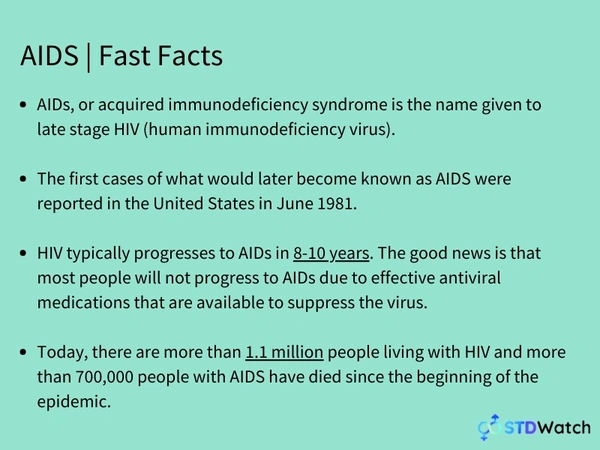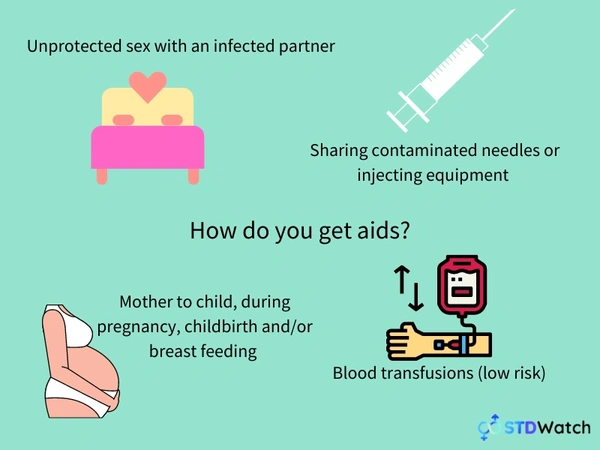AIDs, or acquired immunodeficiency syndrome is the name given to late stage HIV (human immunodeficiency virus).
The first cases of what would later become known as AIDS were reported in the United States in June 1981.
HIV typically progresses to AIDs in 8-10 years. The good news is that most people will not progress to AIDs due to effective antiviral medications that are available to suppress the virus.
Today, there are more than 1.1 million people living with HIV and more than 700,000 people with AIDS have died since the beginning of the epidemic.
Historically, there has been a lot of stigma around AIDs, especially when it was first discovered in the United States in the 1980s.
Luckily, HIV and AIDs are much better understood today, and great efforts have been made to educate wider communities, even within pop culture references such as this year’s hit Netflix show, It’s a Sin.
AIDs describes the last stage of HIV, when your immune system has become so severely damaged by the virus, that you are now susceptible (more open to) opportunistic infections such as:
- Tuberculosis (TB)
- Hepatitis B & C
- Cancer
- HIV-associated neuro-cognitive disorders (HAND)
- Cryptococcal meningitis
- Toxoplasmosis
- PCP (a type of pneumonia)
- Oesophageal candidiasis
Since the beginning of the AIDs crisis, medicines have been developed for people living with HIV who have a low CD4 count to prevent these types of infections.
Antiretroviral treatment is the most effective way to avoid these opportunistic infections.
How do you get aids?
You can get AIDs through:
- Having unprotected sex
- Pregnancy, child-birth or breastfeeding
- Sharing needles
- Blood transfusions
Having unprotected sex
You can get HIV through unprotected vaginal, anal or oral sex with an infected partner. The HIV virus may be passed from one person to another when the blood, semen, or vaginal secretions are passed from an infected person to another.
Infection may occur when the bodily fluids of an infected person enter the body of another person, this could be through open wounds or sores, or even small tears that may occur during sexual activity.
HIV can also be passed through breast milk if an infected mother is feeding her baby.
Pregnancy, child-birth or breastfeeding
Mothers-to-be who are undergoing HIV treatment will have a significantly lower risk of passing HIV to their babies. Untreated HIV in mothers, however, are at risk of transmitting the virus during pregnancy, child-birth or breast-feeding.
Sharing needles
Sharing needles through recreational drug-use or otherwise can significantly increase your risk of getting HIV, and other infections such as hepatitis. If an infected person injects themselves and you proceed to use that same needle, you could get HIV through infected blood that remains on that needle.
Blood transfusion
The risk of getting HIV through a blood transfusion is very low as hospitals and blood banks in the U.S. now screen all blood supplies to ensure that it is clear from infection. However, blood transfusions are still listed as a risk on most accredited health publishers.
Risk factors for aids
There are a number of risk factors for AIDs, as cited from the World Health Organization such as:
- having unprotected anal or vaginal sex;
- having another sexually transmitted infection (STI) such as syphilis, herpes, chlamydia, gonorrhoea and bacterial vaginosis;
- sharing contaminated needles, syringes and other injecting equipment and drug solutions when injecting drugs;
- receiving unsafe injections, blood transfusions and tissue transplantation, and medical procedures that involve unsterile cutting or piercing; and
- experiencing accidental needle stick injuries, including among health workers
The World Health Organization defines key populations as people in populations who are at increased HIV risk in all countries and regions.
Key populations include: men who have sex with men; people who inject drugs; people in prisons and other closed settings; sex workers and their clients; and transgender people.
Can you survive aids?
There is no easy answer to this question. Each person who is diagnosed with HIV or AIDs will have a completely different experience.
Some people who are diagnosed with AIDs may die shortly after, others may live for years, even if they have officially progressed from HIV to AIDs.
According to Kaiser Permanente, the total life expectancy for a 20-year-old person with HIV was 39 years in 1966.
The total life expectancy bumped up to about 70 years in 2011.
FAQs
Can you get aids from kissing someone?
There is a low risk of getting AIDs from kissing someone. For this to happen, there would need to be some very specific factors at play.
As we know, HIV can be passed from person to person when infected bodily fluids find their way into the body through open wounds or sores.
To get HIV from kissing someone, you would need both partners to have open wounds in their mouth. Blood from an infected person would need to find its way out of an open wound in and into the open wound of the kissing partner’s mouth. HIV is not passed through saliva.
What are the chances of getting aids?
According to the Centers for Disease Control and Prevention (CDC) more than 1.1 million people in the United States are living with HIV, and 1 in 7 of them aren’t aware of it. An estimated 39,782 people in the country were diagnosed with HIV in 2016 alone.
How long does it take for aids to go away?
AIDs does not go away. There is no cure for HIV or AIDs, however HIV can proactively and effectively be managed with the use of antiretroviral therapy. Read: HIV treatment | What is the treatment for HIV?
Can you get aids immediately?
Once someone if infected with AIDs, they are immediately contagious which means that you could theoretically get aids from them immediately if you:
- have unprotected anal or vaginal sex with an infected person;
- share contaminated needles, syringes and other injecting equipment and drug solutions when injecting drugs;
- receive unsafe injections, blood transfusions and tissue transplantation, and medical procedures that involve unsterile cutting or piercing; and
- an experience accidental needle stick injuries, including among health workers
Written by Hannah Kingston on May 17, 2021
Resources
- HIV/AIDs - mayoclinic.org
- The HIV/AIDS Epidemic in the United States: The Basics - kff.org
- It’s a Sin - imdb.com
- HIV, other health conditions and opportunistic infections - avert.org
- HIV/AIDS - who.int
- Narrowing the gap in life expectancy for HIV+ compared with HIV- individuals…Life Expectancy Gap Between HIV+ and HIV- Narrows But Persists - natap.org
- How is HIV transmitted? - hiv.gov
- HIV in the United States and Dependent Areas - cdc.gov


